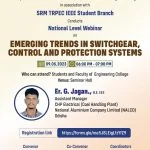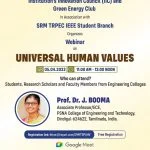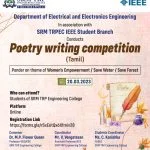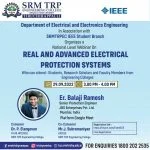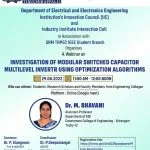Please sign in first
Not a member?
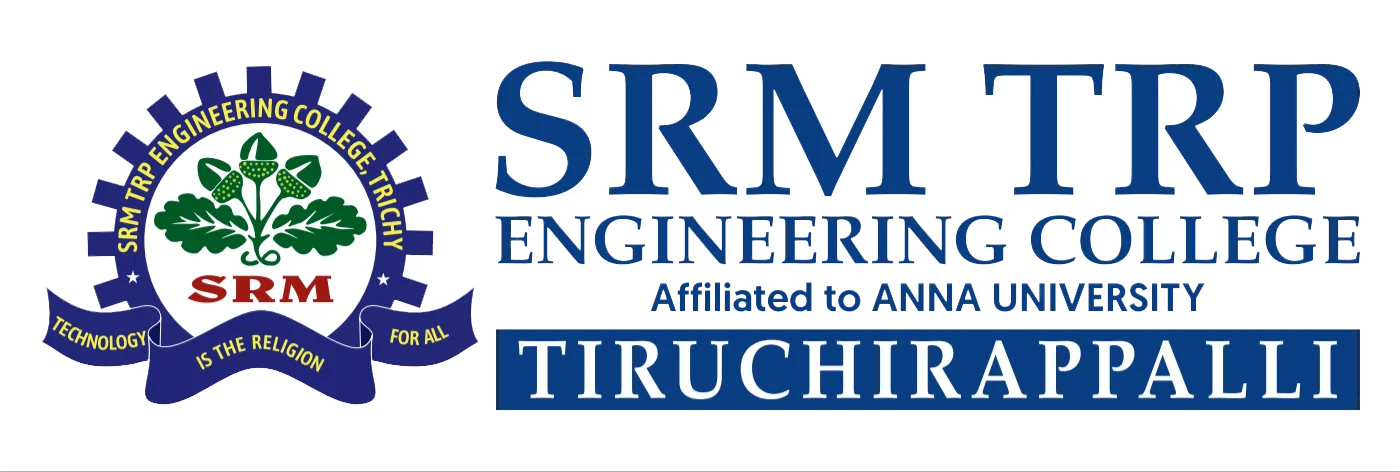
- Home
- About
- Academics
- Research
- Placement
- Admissions
- International Relations
- LIFE @ SRM TRP EC
About The Department
Department of Electrical and Electronics Engineering is one among the core courses offered in the college, approved by AICTE, New Delhi and affiliated to Anna University, Chennai. The department strongly believes in working towards a goal which is not merely theoretical in content but practical in approach. The department has well equipped laboratories through which creative ideas are sown in the minds of the students. The department has separate department library with more than 1500 books. Highly qualified and experienced faculty with specialization in Power Systems, Power Electronics, Applied Electronics, and Energy are looking after research and administration works besides teaching.
VISION
To make certain transformational impact on student community towards learning, innovating, discovering and creating new knowledge with respect to the field of electrical and electronics engineering and serve the country, humanity as well as society at large.
MISSION
M1: To provide well equipped infrastructure and facilities to produce electrical engineers of high caliber to serve the society.
M2: To create an ethical human resource proficient with knowledge and attitude for meeting future needs.
M3: To instill creative thinking among students through training and interaction with industries to become a successful professional.
M4: To provide state-of-the-art resources that contribute to achieve excellence in research and development activities.
M5: To facilitate individual and team activities to enhance personality and soft skills to allow them to grow in diversified fields of their careers as professional engineers, researchers, scientists or teachers
PROGRAM OFFERED
B.E.- Electrical and Electronics Engineering
PROGRAM EDUCATIONAL OBJECTIVES(PSOs)
The graduate of Electrical and Electronics Engineering will have,
PEO1: Strong educational foundation with creative mindset and provide innovative solutions to pursue a diverse range of careers in engineering (Preparation).
PEO2: Technical competency in solving challenging societal tasks in ethical and economical manner with multidisciplinary skills (Core Competency).
PEO3: Exhibit their critical thinking and problem solving skills with professional engineering knowledge to tackle social, technical and business challenges (Breadth).
PEO4: Desire and capability to grow continuously in profession by exhibiting leadership qualities (Professionalism).
PEO5: Update their knowledge continuously through lifelong learning that contributes to personal and organizational growth (Learning environment).
PROGRAM OUTCOMES(POs)
PO1: Engineering Knowledge:Apply the knowledge of mathematics, science, engineering fundamentals, and an engineering specialization to the solution of complex engineering problems.
PO2: Problem analysis:Identify, formulate, research literature, and analyze complex engineering problems reaching substantiated conclusions using first principles of mathematics, natural sciences, and engineering sciences.
PO3: Design/Development of solutions:Design solutions for complex engineering problem and design system components or process that meet the specified needs with appropriate considerations for the public health and safety and the cultural, societal and environmental considerations.
PO4: Conduct investigations of complex problems:Use research-based knowledge and research methods including design of experiments, analysis and interpretation of data, and synthesis of the information to provide valid conclusions.
PO5: Modern Tool Usage:Create, select, and apply appropriate techniques, resources, and modern engineering and IT tools including prediction and modelling to complex engineering activities with an understanding of the limitations.
PO6: The Engineer and Society:Apply reasoning informed by the contextual knowledge to assess societal, health, safety, legal and cultural issues and the consequent responsibilities relevant to the professional engineering practice.
PO7: Environment and Sustainability:Understand the impact of the professional engineering solutions in societal and environmental contexts, and demonstrate the knowledge of need for sustainable development.
PO8: Ethics:Apply ethical principles and commit to professional ethics and responsibilities and norms of the engineering practice.
PO9: Individual and Team Work:Function effectively as an individual, and as a member or leader in diverse teams, and in multidisciplinary settings.
PO10: Communication:Communicate effectively on complex engineering activities with the engineering community and with society at large, such as, being able to comprehend and write effective reports and design documentation, make effective presentations, and give and receive clear instructions.
PO11: Project Management and Finance:Demonstrate knowledge and understanding of the engineering and management principles and apply these to one’s own work, as a member and leader in a team, to manage projects and in multidisciplinary environments.
PO12: Life-long learning:Recognize the need for, and have the preparation and ability to engage in independent and life-long learning in the broadest context of technological change.
PROGRAM SPECIFIC OUTCOMES (PSOs)
Graduates will be able to
PSO1: Analyze and identify and find optimal solutions for the contemporary issues in industrial and societal energy requirements by applying suitable design and control strategies.
PSO2: Apply appropriate modern engineering tools and techniques to engage in lifelong learning and to get an employment in the field of Electrical and Electronics Engineering.
